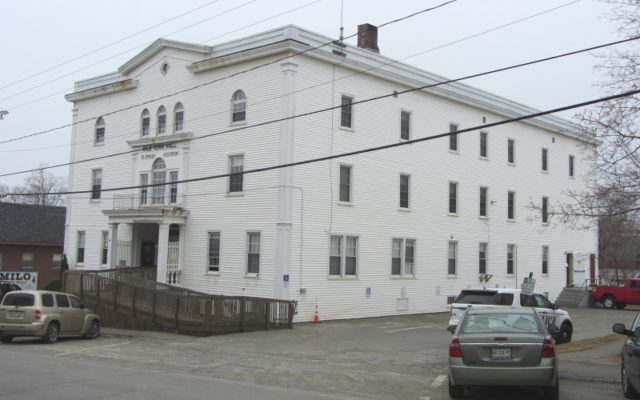
Milo to apply for Derby Shops cleanup funding
MILO — More than a year ago residents accepted the conveyance of the approximate 97-acre Derby Shops commercial railroad property on B&A Avenue. Citizens attending the June 2016 special town meeting also authorized the selectmen to apply for and accept any grants for cleaning up the property, which is the home of Central Maine & Quebec Railway and had been a part of the bankruptcy proceedings for the former Montreal, Maine and Atlantic Railway.
Town officials are now in the process of applying for funding to help clean up the site, and a public hearing on the proposed remediation to make the property more suited for economic development was held at the town hall on Sept. 6.
Ransom Consulting Engineers and Scientists Senior Project Manager Peter Scherr said the town of Milo will be applying for both U.S. Environmental Protection Agency (EPA) brownfields-funded cleanup grants, including a subgrant through the Piscataquis County Economic Development Council (PCEDC) brownfields cleanup revolving loan fund program earmarked to provide monies for local projects. Scherr said the public can submit comments on the proposed project through Friday, Sept. 22 to Town Manager Damien Pickel through the town office or at dpickel@milopolice.com.
Scherr said the hearing was required in the application process “so we can go forward and go after some cleanup funding through EPA grants and low-interest loans.” He explained funds awarded will be used to remediate previously identified hazardous building materials such as asbestos and lead paint before or during renovation or demolition as well as to help manage and clean up impacted soils on the property.
“We are looking to redo the economic development activity and maintain the rail yard,” Scherr said.
“We found six areas of concern,” he said. “We found most liabilities are with remaining liabilities on the property.”
Scherr said structures at the Derby Shops do contain asbestos and lead paint. “If you are are going to disturb those they need to be abated,” he said.
Over the decades various locations on the property were used to work on the railcars and evidence from these repairs shows up in soil samples. “We do not need to meet residential standards as a commercial facility, we are not building condos here,” Scherr said.
He said one cleanup method could be to dig out the soil containing lead and cover and cap this material elsewhere on site. Lesser impacted ground material can also be managed in place and would not need to be dug up.
“This is something long-term, it’s not going to happen overnight,” Scherr said about the cleanup efforts. “We don’t have to seek all the funding at once.”
More financial opportunities would be available if the Derby Shops property was subdivided into several smaller parcels and a survey to create three separate lots is currently being undertaken. “We are going to subdivide and go to the planning board to subdivide into a few different lots to maximize our funding opportunities,” Scherr said. He said up to $200,000 can be sought for each individual parcel.
“The survey has not been officially done yet,” he said, as the plan to convert the 97 acres into smaller lots has not yet been presented to the planning board. Scherr said the subdivision process helped assist redevelopment projects in Dover-Foxcroft at both the former Moosehead Manufacturing and Maine Leathers Tannery properties.
“It’s a win-win for a community when we access the brownfield dollars,” PCEDC Executive Director Chris Winstead said. He said these grants and loans can be used to improve properties, increase the tax base and provide jobs.
“Subdivision needs to occur before application,” Winstead said, as Milo officials hope to apply for funding in the fall and they could learn about the application status in late 2018. The PCEDC executive director said council monies can be used earlier in the clean-up to handle more immediate needs.
“Then we can go to EPA for some of the lower priorities,” Scherr said.
“It’s really important for a town like Milo that’s struggling to get this done at different times,” Selectman Peter Hamlin said about the staggered application process to take care of different needs at the Derby Shops property.